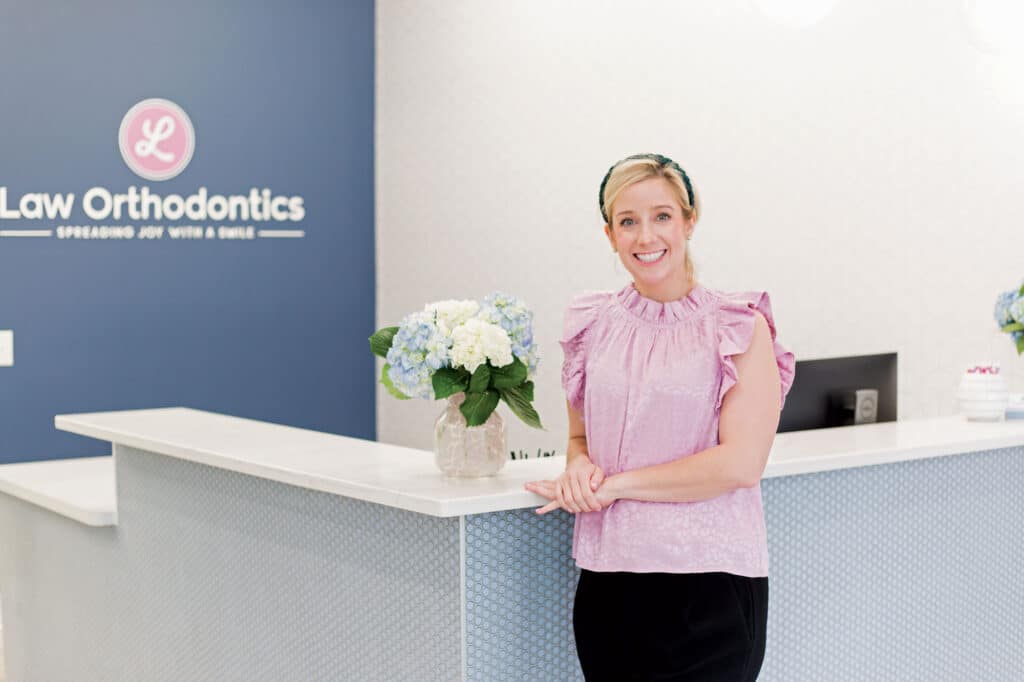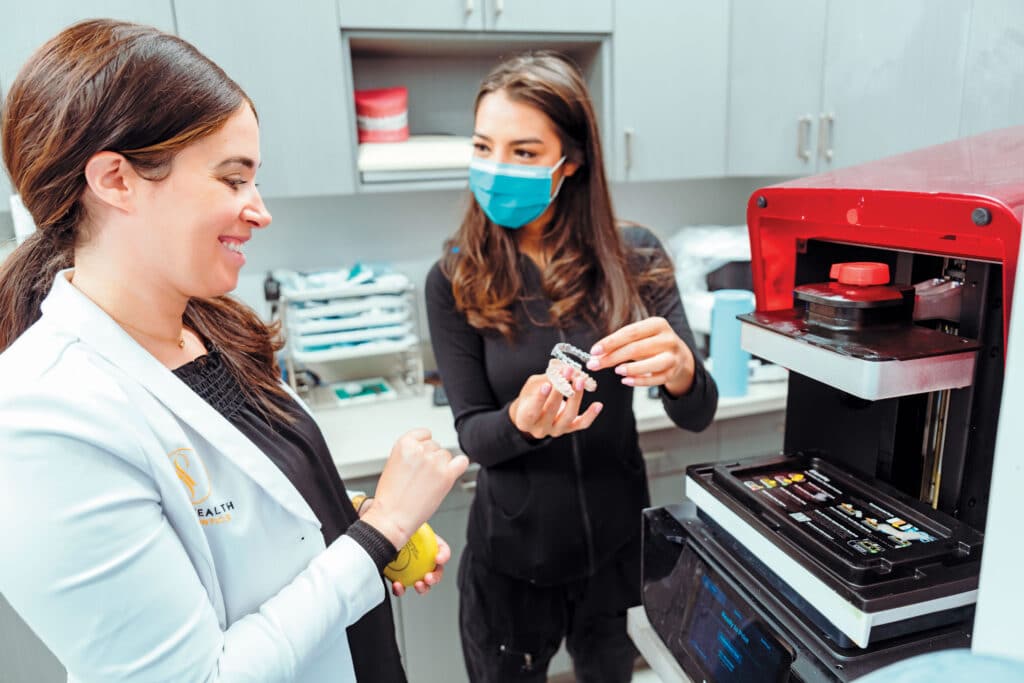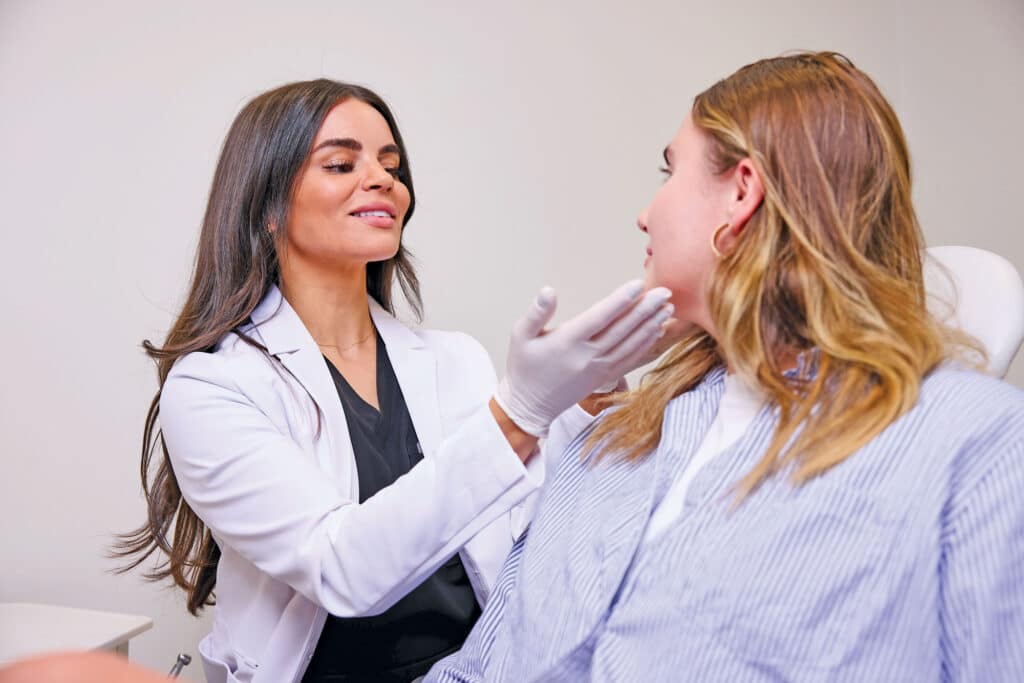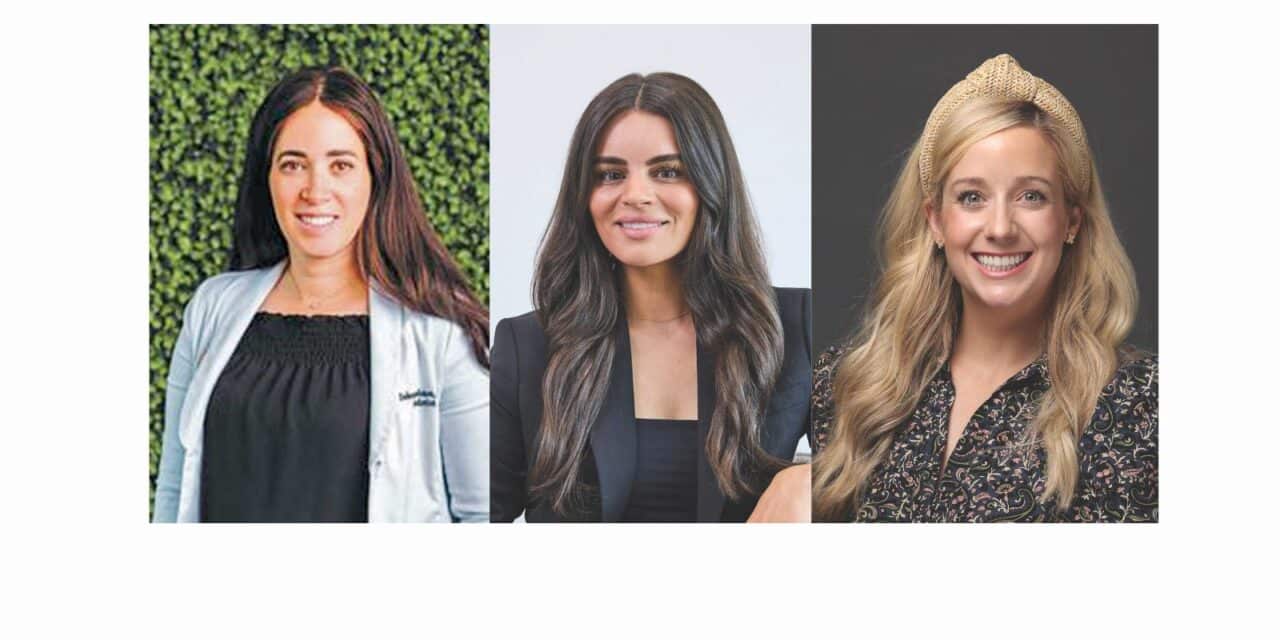Lessons learned, advice tested, and insights from orthodontists who’ve built successful practices.
By Steven Martinez
Starting a new practice from the ground up is one of the most important moments of many orthodontist careers. We reached out to three current practice owners, Deborah Solomon, DDS (above photo left), owner of Smile Health Orthodontics in Los Angeles; Erin Fraundorf, DMD, MS (above photo center), owner of BOCA Orthodontic + Whitening Studio in Ladue, Mo; and Maggie Law, DMD, MS (above photo right), owner of Law Orthodontics in Homewood, Ala, about their experiences in starting and running a practice and asked them how the advice they received measured up to their lived experiences.
Orthodontic Products: What is the best piece of advice you got when you started your practice?
Deborah Solomon, DDS: Patience! Things don’t happen overnight but if you continuously do as excellent a job as you can, eventually things will start to make sense and the practice will be successful.
Erin Fraundorf, DMD, MS: Be patient—success doesn’t happen overnight. Building a thriving practice is a long game that requires persistence, resilience, and unwavering dedication. There will be moments of uncertainty, slow growth, and challenges that test your confidence. But trust the process. Stay committed to your vision, even when progress feels incredibly slow.
Maggie Law, DMD, MS: Treat patients how you would want to be treated and the patients will come. When I’m on the fence about how I want to treat a patient, I just picture my own child in the chair and think if this was my son, what would I do? Also, I make this practice fit my lifestyle and not the other way around. I see patients 5 days a week. I’ll never have a clinic day on Friday. I close when my kids are out of school. I tailor my practice to fit my lifestyle and not the other way around.
OP: What was something you wish you knew before you started your practice?
Solomon: To be careful when hiring staff. Only invest in great potential. Don’t waste time keeping employees who are not representing your practice or aligning with your vision of a great practice.
Fraundorf: I wish I had fully understood just how much running a successful orthodontic practice relies on business acumen. While I felt confident in my skills as an orthodontist, I was obviously not as prepared for the business side of things. The transition from being a doctor to also being a business owner was a steep learning curve—one that at times felt overwhelming. I had to quickly adapt, learning everything from financial planning and marketing strategies to hiring and managing a team, all while ensuring exceptional patient care. Through this experience, I’ve come to appreciate the importance of mentorship, continuous learning, and surrounding myself with the right people.
Law: I knew that running a practice would have good days and bad days and now, being almost 5 years in, I’m so grateful that I made the decision to do this. There are so many orthodontists out there that wish that they could be working for themselves and get out of the corporate and associate model so they can have more control of their life and job satisfaction. I still pinch myself that I get to go to work every day for myself and treat amazing people and work with an amazing team.
OP: What was a tough lesson you learned early on in running a practice?
Solomon: Be very careful before spending on online marketing. They can be a bottomless pit without much return! Especially in my pretty saturated area.
Fraundorf: A valuable lesson I learned early on in running a practice is that you simply can’t do everything yourself. While this might seem obvious, it took me time to truly understand that delegation is not just helpful— it’s essential. Learning to trust others with key responsibilities is crucial not only for the success of your practice but also for maintaining your well-being and relationships.
Law: I think the biggest blessing and the hardest part of my job is my team. I’m really lucky that I have an amazing team and I’ve had very low turnover. However, I have had to let people go and learned that sometimes I should have let them go a little bit sooner even with the fear of being short staffed. It’s hard to find good people, but they are out there.
OP: What would you have done differently if you could start your practice over today?
Solomon: Nothing, I believe that my journey had to happen this way for me to get to where I am which I find pretty close to perfect. I learned so many valuable lessons along the way. I love that I get to see patients only 2 days a week. And the rest of the days I get to focus on myself, my family, digital work, or supporting my staff remotely.
Fraundorf: If I could start my practice over today, I would take a more gradual approach beginning with a smaller space or delaying the build out of some operatories to keep overhead costs lower in the early stages. It’s tempting to build your dream practice right away, but the reality is that growth takes time. Scaling strategically not only eases financial strain but also allows you to dedicate more time, energy, and focus to your practice, rather than relying on outside work to stay afloat.
Law: If I could start my practice over today, I wish I would have named my practice Maggie Law Orthodontics instead of Law Orthodontics to make it obvious that it was owned by a female doctor and not a lawyer. The last name Law is tricky. Also, I would love it if my office had about 300 more square feet. I also hate the position of my junction boxes at my clinic chairs. Other than that, I think my office is incredibly beautiful and fits my aesthetic.

When Law started her practice, she chose to invest in the latest technology upfront. “I’ve never owned alginate. I don’t own bands for teeth,” she says. That investment is something patients notice and has become a powerful conversion tool during new patient consults. Photo courtesy of Maggie Law, DMD, MS.
OP: With hindsight, what was the best purchasing decision, clinical or otherwise you made in starting a practice?
Solomon: It all started when I purchased my little iTero Flex scanner. This mobile device gave me the confidence to go ahead and start building with endless possibilities.
Fraundorf: The best decision I made when starting my practice was choosing the right location—because in orthodontics, location is everything. While I didn’t have the opportunity to purchase the space (I rent), selecting a high-visibility, accessible, and strategically positioned location has been invaluable. Proximity to other businesses, ease of access for patients, and being part of a thriving community all play a crucial role in building a successful practice. Being deeply involved in the community has not only strengthened our brand presence but also helped us foster meaningful connections with our patients beyond their time in the chair.
Law: I’m so grateful I started my practice with a 3D printer and an iTero scanner from day one. I just invested in what the latest technology was that I knew would be beneficial for my practice. I’ve never owned alginate. I don’t own bands for teeth. I now have a second scanner and can’t imagine practicing without that high level technology. It’s actually something patients comment on a lot in our new patient exam. They’re impressed with all that we bring to the table during our new patient consults.

OP: What kind of training or support have you received that made you a better practice?
Solomon: Invisalign support has always been great for me. Their API course is a great source of information and inspiration. I have in-office 3D printing and uLab allows me to make awesome clear retainers for my phase 1 patients with cool pontics that I get to design with my staff. No need to spend money on Hawleys!
Fraundorf: The most valuable training and support I’ve received in building my practice has come from networking with other entrepreneurs—particularly female entrepreneurs—and fellow orthodontists. Connecting with others who have navigated similar challenges, whether they were launching a business or starting a practice, has provided me with invaluable insights, advice, and encouragement. These relationships continue to guide me and have reinforced the importance of mentorship and collaboration.
Law: I think to continue to be a better practice and become a better orthodontist, you have to invest in continuing education and you have to be willing to try new things that are gonna benefit your patient. A lot of the ways that I practice now are different from what I learned in residency. I treated two clear aligner patients when I was in residency. One of them was my mom. Now my practice is almost 50% clear aligners. I have also been really into KLOwen’s indirect bonding for the last 6 months. I’m anxious to see how my cases turn out so I can compare if it really is more efficient for the patient and for my practice. As a busy mom myself, I’m all about trying to save people time.

Fraundorf made a point of networking not only with orthodontists but also with other entrepreneurs—especially female entrepreneurs—when starting her practice. Having a wide network helps her connect with people navigating similar challenges. Photo courtesy of Erin Fraundorf, DMD, MS.
OP: How has your view of private practice changed since you became a practitioner?
Solomon: I had no idea it was going to be that challenging to get to where I am! But it is better this way because I probably wouldn’t have opened my private practice if I knew.
Fraundorf: My perspective on private practice has evolved significantly. In dental school and residency, the focus was always on clinical excellence; perfecting techniques, diagnosing with precision, and striving for ideal outcomes. However, stepping into private practice, especially as a business owner, I quickly realized that not every patient is seeking perfection and we must cater to those types of patients as well. This shift in perspective has been eye-opening, teaching me that success in private practice isn’t solely about clinical expertise—it’s about listening, adapting, and tailoring treatment to best serve each patient’s needs.
OP: When did you feel that you had become a part of your community and was there a decision or moment when you felt like you had made that connection to your patients?
Solomon: When you realize that you are starting to treat a lot of the siblings of the original patients that you had, that’s when word of mouth becomes real.
Law: I practice about 3 miles from where I live, so I almost practice in the community where my home is. It’s all close together. I was overwhelmed the other day when I was reading responses on a local Facebook page when people were asking for suggestions for an orthodontist. So many of my current and former patients were recommending our office and saying the nicest things about myself and my team. I really felt like I had made it. My husband even saw the post and was like wow, did you see all the nice things people were saying about you? It really made me feel grateful and I know that we are making a difference in people’s lives. OP
Steven Martinez is a freelance writer for Orthodontic Products.









